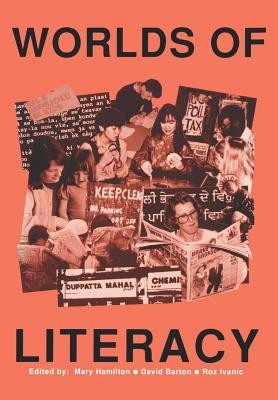
- We will send in 10–14 business days.
- Publisher: Multilingual Matters Limited
- ISBN-10: 1853591955
- ISBN-13: 9781853591952
- Format: 17 x 24.4 x 1.5 cm, softcover
- Language: English
- SAVE -10% with code: EXTRA
Worlds of Literacy (e-book) (used book) | bookbook.eu
Reviews
Description
The idea behind this book is that in complex societies like our own there are different worlds of literacy that exist side by side. People belong to different cultural groups: we lead different lives, we read and write different things in different ways and for different purposes. The idea that literacy is embedded in social context, that there are different literacies, is now accepted. This book presents a range of case studies describing some of these worlds of literacy and is carefully organised by theme, so as to bring out both the differences and connections between them. It will be a source book for students on courses of literacy studies. The case studies span the whole age range, but the book focuses particularly on the variety of uses of literacy in adult life, both inside and outside of formal education. The authors argue that in order to understand literacy and help people learn to read and write, we must look beyond school to the everyday uses of written communication. The contributors come from diverse backgrounds: they include students and teachers in adult basic education, higher education and schools: others are community publishers and researchers, several of whom are internationally known. They share a commitment to plain, accessible language. The book is extensively illustrated and 'sign-posted' to enable readers to move easily between case studies and themes. This makes it a book to dip into which can also be enjoyed by anyone concerned with the role of written communication in education and society as a whole. The themes that are dealt with include different voices, literacy and identity, the role of literacy in making choices and change, collaborative writing and creating new forms of written expression; gender and literacy, bilingual literacy, spoken and written language, children and adult learners, public and private uses of literacy, and bureaucratic literacy.
EXTRA 10 % discount with code: EXTRA
The promotion ends in 19d.06:44:12
The discount code is valid when purchasing from 10 €. Discounts do not stack.
- Publisher: Multilingual Matters Limited
- ISBN-10: 1853591955
- ISBN-13: 9781853591952
- Format: 17 x 24.4 x 1.5 cm, softcover
- Language: English English
The idea behind this book is that in complex societies like our own there are different worlds of literacy that exist side by side. People belong to different cultural groups: we lead different lives, we read and write different things in different ways and for different purposes. The idea that literacy is embedded in social context, that there are different literacies, is now accepted. This book presents a range of case studies describing some of these worlds of literacy and is carefully organised by theme, so as to bring out both the differences and connections between them. It will be a source book for students on courses of literacy studies. The case studies span the whole age range, but the book focuses particularly on the variety of uses of literacy in adult life, both inside and outside of formal education. The authors argue that in order to understand literacy and help people learn to read and write, we must look beyond school to the everyday uses of written communication. The contributors come from diverse backgrounds: they include students and teachers in adult basic education, higher education and schools: others are community publishers and researchers, several of whom are internationally known. They share a commitment to plain, accessible language. The book is extensively illustrated and 'sign-posted' to enable readers to move easily between case studies and themes. This makes it a book to dip into which can also be enjoyed by anyone concerned with the role of written communication in education and society as a whole. The themes that are dealt with include different voices, literacy and identity, the role of literacy in making choices and change, collaborative writing and creating new forms of written expression; gender and literacy, bilingual literacy, spoken and written language, children and adult learners, public and private uses of literacy, and bureaucratic literacy.


Reviews